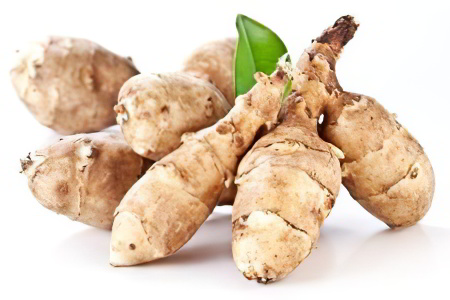Inulin - benefits and harms, instructions for use
From time to time, for one reason or another, various products rise on a wave of consumer popularity. Interest in them is growing, everyone is studying the exclusive properties, trying to purchase this product and put it into practice. Sometimes, as in the case of inulin, such interest is completely justified, because the valuable qualities of this substance make it extremely useful for the human body.
What is inulin and what is it for?
Inulin is a natural polysaccharide with a sweetish taste that has no synthetic analogues. It is found in more than 3,000 plants, mainly in their roots and tubers. Its popularity is due to the valuable qualities of the polysaccharide. Being a natural prebiotic, when inulin enters the human gastrointestinal tract, it improves intestinal motility, stimulates digestion, and provides nutrition and growth of valuable bifidobacteria. Human digestive enzymes are not able to digest inulin, so it completely retains its valuable properties in the digestive tract.
Benefits of inulin
Since the formula of this polysaccharide is close to the formula of fiber, the acidic environment of the stomach is not able to affect inulin. It undergoes partial breakdown in the intestines, where working microorganisms convert inulin into a nutrient medium for their reproduction. Growing colonies of beneficial bacteria displace pathogenic flora, thereby healing the intestines by stimulating the biochemical reactions of digestion.
The remaining undigested part of inulin, passing through the intestines, cleanses it of toxins, radionuclides, and “bad” cholesterol. Manufacturers actively take advantage of this property, producing many types of food additives and products designed to cleanse the body.
Other valuable properties of inulin:
Inulin promotes the absorption of beneficial microelements necessary for human life: calcium, magnesium, iron, copper, phosphorus. Thanks to its mediation, the absorption of these minerals increases by 30%, the formation of bone tissue is stimulated, its density increases by 25%, and osteoporosis is prevented.
Inulin is an immunomodulator, increasing the intensity of metabolic processes and increasing the body's endurance.
Creates the illusion of satiety without adding calories to food, promoting weight loss.
It perfectly replaces natural coffee without harming digestion and the nervous system.
Gives products a rich, creamy taste without increasing their calorie content.
Thanks to the reaction of lymphoid tissue to the introduction of inulin into the digestive tract, the human immune system is strengthened, as the local immunity of the ureters, bronchial tree, and gastrointestinal mucosa is increased.
The hepatoprotective properties of inulin consist in stimulating the restoration of damaged liver tissue, which helps in the treatment of hepatitis B and C.
Harm of inulin
This polysaccharide does not have any dangerous properties and is unable to have a negative effect on the human body. Inulin is included in hypoallergenic baby food for infants, which undergoes several stages of quality control. The only side effect of this substance is the stimulation of increased gas formation. In addition, inulin is not recommended to be taken with antibiotics, as it reduces the effectiveness of drugs in this group.
Inulin from Jerusalem artichoke
Most of the inulin offered to consumers is produced from Jerusalem artichoke tubers. For this purpose, varieties with a high content of this polysaccharide, bred through breeding work, are used. For the production of inulin, gentle technology is used that preserves its valuable properties as much as possible. The output is a concentrated powder with a high polysaccharide content. Jerusalem artichoke is a unique plant, the tubers of which do not accumulate nitrates in any method of cultivation. This plant is capable of converting toxic substances into safe compounds.
Instructions for using inulin
The dietary supplement Inulin is available in the form of powder, crystals, and 0.5 g tablets. It is a 100% unmodified polysaccharide found in its natural state. Its structure completely replicates the structure of a living cell. 100 g of dietary supplement Inulin contains 110 kilocalories.
Indications:
Dysbacteriosis, Atherosclerosis, Diabetes mellitus, Cholecystitis, Chronic hepatitis, Fat metabolism disorders, Prevention of colon cancer.
The drug is taken in courses with a break between them of 1-2 months. The course requires 3 bottles of Inulin.
Dosage:
Tablets – 1-2 pcs. 3-4 times a day;
Powder - 1 tsp. before meals (1-3 times a day).
Before use, crystals and powder are dissolved in any liquid - water, kefir, juice, tea. Of course, it is better to consult a doctor first. But even with long-term use, there are no side effects from taking the dietary supplement.
Post time: Nov-09-2023




